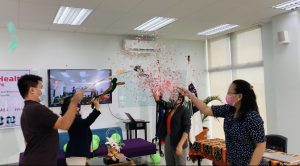
Mindanao scientists are now in anticipation of the first research center to be established in the region aimed to strengthen local response to infectious diseases, including COVID-19.
On 3 May 2021, the Department of Science and Technology and the University of the Philippines (UP) Mindanao launched AMDABiDSS-Health, or Center for Applied Modeling, Data Analytics, and Bioinformatics for Decision Support Systems in Health while observing proper precautionary measures at Malayan Colleges Mindanao with viewers supporting via Zoom.
As the first research center in the region that uses interdisciplinary quantitative approaches and improved disease surveillance techniques, the AMDABiDSS-Health is subdivided into four components:
- Project 1: Predictive Modeling and Viral Phylodynamic Analysis on the Spatial and Temporal Patterns of Disease Outbreaks with considerations for Control and Logistics applied in Mindanao region – aims to develop a tool that integrates mathematical and genomic approaches to predict the spread of COVID-19 in affected parts of Mindanao region
- Project 2: Risk Management and Enhanced Survival Analysis Integrated through Longitudinal Infectious Disease Data and Statistical Epidemiological Model using Clinical Risk Factors – aims to develop solutions and strategies to effectively manage the risks associated with COVID-19 using interdisciplinary applied modeling systems and processes
- Project 3: Vulnerability Assessment Tool: A Decision Support System for Pre-Emptive Preparedness on Emerging Infections Among Animal Reservoir in Urban Green Spaces – aims to develop and validate a vulnerability assessment tool for emerging infectious diseases using Davao City as a pilot model
- Project 4: Integrated Wastewater-Based Epidemiology and Data Analytics for Community-Level Pathogen Surveillance and Genetic Tracking: Proof-of-Concept – aims to establish a proof-of-concept for wastewater system-based epidemiology as a complementary approach for COVID-19 surveillance with Davao City as a pilot study area
“Today is a historical day, aside from the fact that this is our program wide meeting, today is the conception anniversary of the AMDABiDSS. We became victors of circumstance as we are able to use the negative situation as an opportunity to build, unite and aid sustainable solutions to our community towards a healthier Mindanao, and even in other parts of the country. DOST-PCHRD helped us pave the way to build this dream into fruition. Kamo gyud ang nagsuporta sa amo ani,” said Dr. May Anne Mata, Program Leader of AMDABiDSS-Health and Head of Interdisciplinary Applied Mathematics Laboratory of UP Mindanao.
AMDABiDSS-Health is part of DOST’s Niche Centers in the Regions or NICER Program, one of the four components of DOST Science for Change Program that aims to establish R&D centers in the regions to promote regional development.
“Through DOST’s NICER Program, we aim to catalyze regional development by capacitating institutions to make significant improvements through research. We congratulate UP Mindanao for finally realizing AMDABiDSS-Health after months of hard work and dedication. Thank you for being DOST’s partner in making lives better for the Filipinos through health research,” said DOST Secretary Fortunato de la Peña.
Funded by the DOST – Philippine Council for Health Research and Development (PCHRD), AMDABiDSS-Health ultimately aims to benefit Local Health Agencies and Local Government Units (LGUs) in Mindanao through infectious disease control and monitoring component, Higher Education Institutions (HEIs) who will benefit from the training and workshops of each project, the Department of Health (DOH) that will be provided with data on population-level prevalence of COVID-19 faster and with lesser resources than individual testing, and other environmental health researchers who will be capacitated with knowledge and resources to push ONE HEALTH agenda in Infectious Disease research.
(This article was first published in the PCHRD Website on May 12, 2021)
